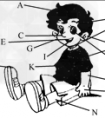根据括号中的汉语提示, 用单词的适当形式填空。1. —When did you _______(成为) a soccer player?—Two years ago.2. Mike is the old woman’s _______(孙子).3. The -七年级英语
36.do a good thing (deed) 做一件好事
37.fall ill=be i11 生病,患病
38.take sb. to a hospital 把某人送到医院
39.rain heavily 下大雨
40.on the road 在公路上
41.not know what to do 不知道该做什么
42.just then 正在那时
43.come up 走进,上来
44.in front of 在……前面
45.thank sb. again and again 反复感谢某人
46.drive away (汽车)离开
run away 跑开
take away 拿走
47.right away 立刻
48.right now 此刻,刚才,现在
49.get home 到家 get there 到达哪儿 get here 到达这儿
50. yesterday morning 昨天晚上
51.leave the hospital 离开医院
52.no buses=not any buses 没有车
53.say to sb.对某人说 say to oneself 自言自语
54.fall off 跌落
55.need to get up early 需要早起床
56.hurt my arm 胳膊受伤
57.What's wrong with you?=What's the matter with you? 你怎么了?
58.do one's homework on the computer 在电脑上做作业
59.have four English lessons 上四节英语课
60.once a week 一周一次 twice a year 一年两次 three times a month 一个月三次
61.do more listening and speaking 做大量的听说练习
do some cleaning 扫除
do some washing 洗衣服
do some shopping 购物
62.make good progress in English 在英语方面取得很大进步
63.help a lot in our studies 在学习上给子很大帮助
64.teach sb. English 教某人英语
65.get to school 到达学校
66.give sb.lessons 给某人上课
67.ask sb.to do sth.要求某人做某事
ask sb.not to do sth.要求某人不要做某事
68.let sb. do sth.让某人做某事
1et sb. not do sth.让某人不要做某事
69.not……until 直到……才
70.make one's lessons interesting 使某人的课上的很有趣
71.tell sb. how to do sth.告诉某人怎样做某事
72.try to learn new things be oneself 设法靠自己学一些新的知识
73.want to be a history teacher 想成为一名历史老师
74.grow up 长大
75.in future 在将来
76.computer room (电脑)机房
77.language lab 语言室
78.finish middle school 中学毕业
79.want to become (be) a designer 想成为一名设计家
80.wish to be doctor 希望成为一名医生
81.an American boy 一个美国男孩儿
82.study in a high school 在高中学习
83.in Grade Eight 在八年级
84.finish primary school 小学毕业
85.start school at the age of seven
=begin to school when I was seven 七岁开始上学
86.move to Washington with his family 和他全家搬到华盛顿
87.be interested in 对……感兴趣
88.want to become a doctor of Chinese medicine 想成为一名中医
89.come here to learn Chinese 来这儿学习中文
90.a nice school 一所好的学校
91.instead of 代替
92.in many ways 在许多方面
93.be different from 与……不同
94.by the way 顺便说
95.come back home 回家
96.be sorry for 为…难过,遗憾
97.feel sorry for 为…难过,遗憾
98.burn away 燃烧没了
99.open the door 开门
100.take sb. in one's arms 拥抱某人
101.have some medicine 吃药
102.have a football match 进行一场足球比赛
103.have a meeting 开会
104.walk back 向后走
105.give sth. back to sb. 把某物还给某人
106. work through the night 通宵工作
107.get through the examinations=pass the exam 通过考试
108.happen to 发生
l09.knock at the door 敲门
110.want to do sth. 想做…
111.fall down 掉下来
112.begin to do sth. 开始做…
113.have some tea 喝茶
114.have sports 进行体育锻炼
115.have a bad coId 得了重感冒
116.have a good time 玩的很高兴
117.keep back 向后退
118.so…that 如此…以至于…
考点名称:动名词
- 动名词:
如果一个动词加上了ing变成了名词,那么这个词称动名词。 动名词是一种兼有动词和名词特征的非限定动词。
它可以支配宾语,也能被副词修饰。
由于动名词是由动词变化而来,它仍保留着动词的某些特征,具有动词的某些变化形式,用以表达名词所不能表达的较为复杂的意念。
动名词的名词特征表现在它可在句子中当名词来用,作主语、宾语、表语、定语。 动名词的结构和形式:
动名词的否定结构:
动名词的否定结构由not 动名词组成。如:
Trying without success is better than not trying at all. 实验没有成功也比不实验好。
He hated himself for not having work hard. 他悔恨自己没有用功。
I’m sorry for not having telephoned you before. 很抱歉,没有早给你打电话。
He felt sorry for not having done the work well. 他为没有把工作做好感到难过。
I fancy it has done you a lot of good not going. 我看不去对你倒好了。
(not going 是动名词一般式的否定形式)
There is no denying the fact that he si diligent.
(no denying 也是动名词一般式的否定)动名词复合结构:
通常情况下,动名词的逻辑主语为谓语动词的主语。如果动名词动作的发出者不失谓语动的主语时,则需要有自己的逻辑主语物主代词或名词所有格加动名词就构成了动名词的复合结构,这种结构在句中可以作主语,宾语等。
(1)逻辑主语是有生命的名词作主语时,必须用名词或代词所有格,作宾语时(尤其在口语中),也可用名词普通个或人称代词宾格。如:
Do you think my going there will be of any help?
你看我去会有什么帮助吗?(宾语)
The student’s knowing English well helps him in learning French.
这位学生通晓英语对他学法语很有帮助。(主语)
Do you mind my(me) smoking ? 你介意我抽烟吗?(宾语)
They insist on Mary’s (Mary) going with them there.
他们坚持要玛丽跟他们一起去那儿。(介词宾语)
(2)逻辑主语是无生命名词是,通常只用名词普通格。如:
Do you hear the rain pattering on the roof?
你听见雨点打在屋顶上了吗?
Is there any hope of our team winning the match ?
我们对赢得比赛有希望吗?
(3) 逻辑主语是指示代词或不定代词this that , somebody , someone , nobody, none, anybody, anyone 时,只用普通格。如:
She was woken up by somebody shouting outside.
她被外面喊叫的人吵醒了。动名词的形式(一般式,完成式和被动式):
(1) 动名词的一般式所表示的动作与谓语动词所表示的动作同时发生,或在谓语动词表示的动作之后。如:
We are very interested in collecting stamps. 我们对集邮很感兴趣。
His coming will be of great help to us . 他来对我们大有帮助。
但是有些明确表示时间的动词和介词 after, on,upon, 或for之后,常用一般式代替完成式,表示动作发生在谓语动作之前。如:
I shall never forget seeing the Great Wall for the first time.我永远不会忘记第一次看到长城的情景。
On hearing that bad news , the mother couldn’t help crying. 一听到这个糟糕的消息,母亲就禁不住哭了起来。
Excuse me for coming late. 我来晚了,请原谅。
Thank you for giving us so much help. 谢谢你给了我们这么多帮助。
(2) 动名词的完成式所表示的动作或状态在谓语动词之前完成或结束。
He regrets not having taken part in the work. 他后悔没有参加这项工作。
We were praised for having finished the work ahead of time. 我们因提前完成了这项工作而受到了表扬。
(3)动名词的被动式:当动名词的逻辑主语是行为承受者时,用被动语态。如:
I like being given harder work. 我喜欢接受难点的工作。
She is proud of being admitted into the university. 她为被大学录取而感到自豪。
The meeting was put off without his having been consulted. 会议延期并未和他商量。
He doesn’t mind having been criticized. 他不介意过去受到的批评。动名词与现在分词的关系:
动名词它在形式上与现在分词相同,都是在动词原形的词末加-ing。在现代语法中,这两种形式同视为"-ing形式"。
这两种形式的另一个相同之处是:
它们都是由动词变化而成的,它们都保留了动词的某些特征,它们都能带自己的宾语、状语,而构成动名词短语或是现在分词短语去担当句子成分。
例如:
Speaking in the public,he will surely be very cheerful .
(现在分词短语,作状语)他在公众场所讲话时总是兴高采烈的。
She hates speaking in the public.
(动名词短语,作宾语)她不喜欢在公众场所讲话。动名词和现在分词都可以用于系动词之后作表语,区别方法是:
①作表语的动名词与主语指的是同一件事,此时系动词相当于“是”,通常把主语和表语的位置互换,语法和意思不变,例如:
My hobby is swimming.可改为Swimming is my hobby.(可将原句中的主语与表语位置互换)
- 最新内容
- 相关内容
- 网友推荐
- 图文推荐
| [家长教育] 孩子为什么会和父母感情疏离? (2019-07-14) |
| [教师分享] 给远方姐姐的一封信 (2018-11-07) |
| [教师分享] 伸缩门 (2018-11-07) |
| [教师分享] 回家乡 (2018-11-07) |
| [教师分享] 是风味也是人间 (2018-11-07) |
| [教师分享] 一句格言的启示 (2018-11-07) |
| [教师分享] 无规矩不成方圆 (2018-11-07) |
| [教师分享] 第十届全国教育名家论坛有感(二) (2018-11-07) |
| [教师分享] 贪玩的小狗 (2018-11-07) |
| [教师分享] 未命名文章 (2018-11-07) |






